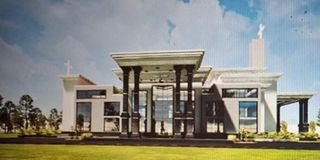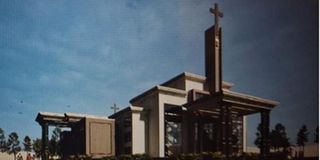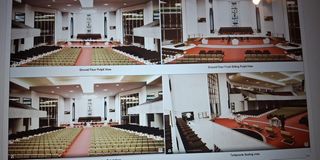Lawyer sues President Ruto over Sh1.2 billion State House church

The Western view in daytime of the massive church whose construction is ongoing within the grounds of State House, Nairobi.
What you need to know:
- Lawyer Levi Munyeri believes the President required parliamentary approval before commencing the project.
- He accuses the President of violating several sections of the Constitution particularly Article 8.
A petition seeking to stop President William Ruto from continuing with the ongoing construction of a church within State House, Nairobi, has been certified as urgent by the High Court.
Justice Lawrence Mugambi has also granted Attorney-General Dorcas Oduor seven days to file a response to the petition on behalf of the President addressing the alleged illegalities and constitutional violations.
The petitioner, lawyer Levi Munyeri, argues that the Sh1.2 billion project violates the Constitution and that the President’s actions amount to endorsing Christianity as a superior or state religion.
“The construction of a mega church at State House grossly undermines the constitutional provisions that denounce any State religion and affirms the doctrine of separation of Church and State. If allowed to proceed, the construction poses a real risk of diluting constitutional dictates on religion and may lead to increased religious tension in Kenya,” Mr Munyeri contends.

The Western entry view in daytime of the massive church whose construction is ongoing within the grounds of State House, Nairobi.
He believes the President required parliamentary approval before commencing the project, and that it should have undergone a public participation process.
Describing the move as a “blatant and unprecedented infraction of multiple constitutional provisions,” Mr Munyeri states that President Ruto has openly admitted to constructing a mega church within the State House complex, without public involvement or parliamentary approval.
He accuses the President of violating several sections of the Constitution particularly Article 8, which provides that "there shall be no State religion," and the Lands Act, 2012, which outlines the process for allocating public land for private use.
Architectural designs of the massive church, whose construction is ongoing within the grounds of the State House, Nairobi.
In the petition filed at the High Court in Milimani, Nairobi, the petition argues that the project has been shrouded in secrecy and that Kenyans were unaware of it until media reports emerged last week.
Court documents show that the church structure is already taking shape and is visible in satellite images near the presidential helipad at the State House complex.
Pending the petition’s determination, Mr Munyeri is seeking interim orders halting the construction.
He fears that without such orders, the President may complete the project and in the process, misuse public resources.
Public land
“Unless the court issues a conservatory order halting the construction of the mega church at State House, public resources will be plundered and the public’s right to participate in the use of public land will be negated,” he states.
He further argues, "if the said construction is allowed to continue, the Constitution will stand violated and a dangerous precedent that the government is allowed to elevate one religion against the rest".
Mr Munyeri also challenges President Ruto’s justification that the church is being privately funded.
"President’s claim that the money is being utilised to construct the said mega church is not taxpayers’ money but rather the President’s own money, whereas bizarre, does not cure the unconstitutionality. A private citizen has no legal authority to construct anything on property that is public land unless and until legally authorised after following the due process," argues the petitioner.
He adds that this justification is not only misleading and unrealistic but also undermines constitutional values of public participation, transparency, rule of law, equality and non-discrimination.
"State House lies on public land, and contrary to the assertion by the president in his speech on July 4, 2025, that aimed to justify the said construction on the basis that he is funding the said construction with his own money, one cannot undertake to construct a mega church on public land without proper authorisation as spelt out in Article 62 of the Constitution. Therefore, it matters not that the funding is from the President, such funding cannot allow the President to convert public land to private land," says the petitioner.
An architectural drawing of the massive church whose construction is ongoing within the grounds of State House, Nairobi.
Article 62 provides that land lawfully held, used, or occupied by a state organ is public land whose use is managed by the National Land Commission.
"A church is a place of worship for Christians, which is just but one of the religions subscribed to in Kenya and State House is the official residence of the Head of State. State House is part of the Presidency and a symbol of national unity hence a violation of the Constitution for such a vital symbol to pursue a preferred religion to the exclusion of others," argues Mr Munyeri.
He further references Section 12 of the Land Act, 2012, which sets out the conditions under which public land can be allocated including planning, surveying, and development guidelines. None of these, he argues, have been fulfilled in the President’s case.

Architectural designs of the massive church whose construction is ongoing within the grounds of State House, Nairobi.
He contends that no evidence has been presented to show that the portion of land designated for the church has been properly allocated to the President in accordance with the law.
Mr Munyeri wants the court to declare the President’s actions unconstitutional and to issue orders barring the President whether personally or through his office from continuing with the construction or funding of the church.
He is also seeking a mandatory injunction requiring the Attorney-General to demolish the structure that has already been erected.
The case is scheduled to be mentioned on July 24, 2025, for further directions.


